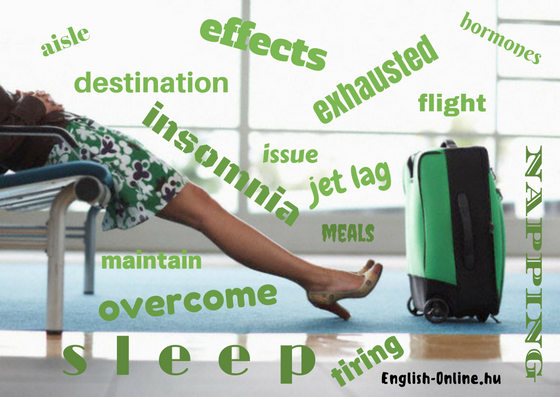Time Travelling
Jet lag can ruin your long-haul holiday, but our expert advice will leave you less spaced-out

Repültél már egyik időzónából egy másikba? (No, it's not a sci-fi movie casting..) Akkor valószínűleg nem ismeretlen számodra a JET LAG jelenség. A következőkben egy olyan cikket alakítottam át TELC Language Elements feladattá, mely e közismert utazóbetegség élettani hátterét mutatja be és hasznos szakértői tippeket ad arra, hogyan minimalizálhatjuk a JET LAG kellemetlen tüneteit.
A feladat hagyományosan: az alábbi 15 kifejezés közül csak 10 illik a szövegben elhelyezett GAP-ekbe. Melyek ezek és hova kerülnek?

Toddlers who refuse to sleep, adults cranky and hungry at the wrong time and a body clock that has gone haywire. Sound familiar? Yes, that's a long-haul holiday for many people. Jet lag is a physical inevitability for most of us when flying long distances, but there are ways to minimise its __________(1). It's all down to eating, sleeping and moving - we are loath to say exercise, because it isn't - so read on.
Your body has a natural clock set by the hours of sunlight you are exposed to daily. The light travels deep into your eyes and reaches the pineal gland, which in turn sends messages to __________(2) in your body that tell you when to wake up, when to feel tired, when to eat and even when to go to the toilet.
The trouble when you fly is that you are trying to reset this internal body clock quickly and it won't play game. It wants to, but it takes time - an estimated one day per one hour of time difference. In practice, that means it could take the entire two weeks of your holiday to __________(3) a 14-hour time difference, or a week to get over a typical flight to the US East Coast, say.
And guess what? Then you have to travel home and go through it all again.
We all know the symptoms of __________(4) - fuzzy head, tired during the day, wide awake at night, hungry but never at mealtimes and the sudden desire to go to the toilet at weird times. However, there are some simple things you can do to help reset your your body clock as quickly as possible to minimise these symptoms.
Lisa Artis of the Sleep Council stresses that diet, moving and getting out in the sunlight and fresh air are key.
✈THE DAY BEFORE
"Diet plays a large part in setting your body clock. The day before you fly, make sure you eat three balanced __________(5), including at least five servings of fruit or green vegetables and one portion of protein-rich food, such as white fish or tofu."
✈ON THE PLANE
"Drink plenty of water on your journey and while on holiday to keep your body hydrated and feeling refreshed. Once on the plane, set your watch to the local time of your __________(6). Pack an eye mask and ear plugs and use them if it's nighttime where you're going. Equally keep the light on and mask off if it's daytime in your destination. Whether on your journey there or on your way home, eat according to the mealtimes of the place you're going, avoid alcohol and take regular walks up and down the __________(7)."
Érdekelnek az angolos videók?
✈WHEN YOU LAND
"Try to get out and about as soon as you can if you land in daylight. Enjoy the sunlight and let it help reset you pineal gland. Also, try to eat at the time of your destination's mealtimes, even if it's only a snack to help reset your digestive tract. Stay active and avoid __________(8) until bedtime - get out and walk in the fresh air. If you arrive and it's nighttime, have a carbohydrate-rich meal, pop two magnesium citrate tablets to help your body rest - magnesium is a natural muscle relaxant - and try to sleep. Don't stress if you can't - simply lie quietly in the dark and gather your thoughts; try to relax and enjoy the quiet."
✈ON HOLIDAY
"During your break away, __________(9) a healthy diet to help control your wakefulness: high protein meals increase your alertness while lots of carbohydrates make you feel sleepier. If you can, take your pillow with you for some familiarity and comfort. For less exotic destinations, the problems are more likely to be about comfort than jet lag. An eye mask and ear plugs will help you sleep if noise or light outside is an __________(10). Keep your bed as a sleep zone and check the temperature. Ensure you keep the bedroom cool -the ideal sleeping environment is 16-18 °C."
/Adapted from the British Press/
Hogy tetszett a TELC ÍRÁSBELI feladat?
Ha megért egy LIKE-ot, nyomj egy LIKE-ot! :D
Magánórát vennél? ITT léphetsz kapcsolatba velem.
Szókincsbővítő feladatot ITT találsz!
Nyelvtani posztot ITT!
Szövegértést ERRE!
Listeninget? ÍME!
Cheers,





 nyelvoktató csatornámra!
nyelvoktató csatornámra!
